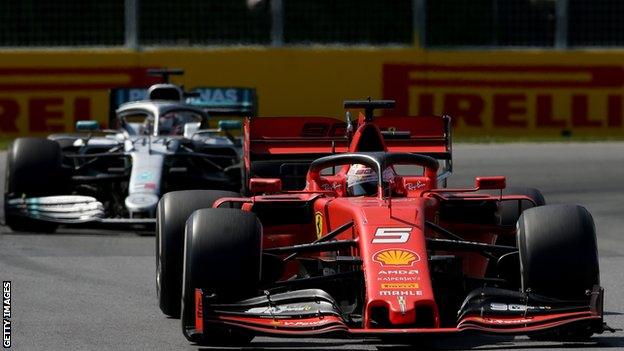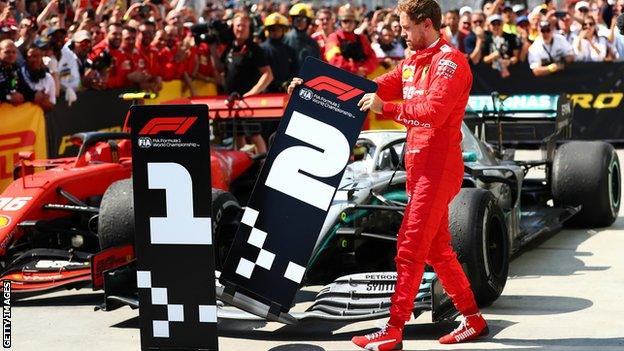Jolyon Palmer column: Why Sebastian Vettel deserved his penalty
- Published

Former F1 driver Jolyon Palmer, who left Renault during the 2017 season, is part of the BBC team and offers insight and analysis from the point of view of the competitor.
I've been at odds with the Formula 1 stewards before - both during my career and after it - but this time I'm in complete agreement. Sebastian Vettel deserved his five-second penalty in the Canadian Grand Prix.
The Ferrari driver had driven a perfect weekend, until his mistake on lap 48 of 70. But in that moment he simply cracked under moderate pressure from Lewis Hamilton and it cost him the race.
By the letter of the law, Vettel was guilty.
He either crowded another driver off the circuit - Hamilton into the wall on the exit of Turn Four, to the point where the Mercedes driver had to anchor on the brakes to avoid a collision.
Or, as his defence said, his natural momentum took him across the full width of the circuit. But in that case he is guilty of rejoining the circuit in an unsafe manner, as he was not in full control of his car, to the extent that he ran Hamilton off the road in an unsafe manner.
One of these scenarios has to be correct.
If he was forced to run all the way into Hamilton, that's not safe. If he wasn't, then he deliberately did it, and that's not fair and deserves a penalty.
You can't have it both ways, and you need to have it both ways to avoid the penalty here.
Whether the rules are right is a separate issue

Sebastian Vettel had a narrow but consistent lead over Lewis Hamilton before picking up the five-second penalty that cost him victory
Where a lot of other former drivers have offered opinion is in regards to the 'nanny state' in Formula 1 at the moment. But the 'we need to let the drivers sort it out on track' argument is a separate issue to whether Vettel should have been penalised.
That's a story for the bigger picture and further down the line, and a question of whether the regulations need to be amended. For now, in 2019, the drivers must race to the rules that exist in 2019.
After a patchy spell of stewarding a few years ago, the drivers have been continually demanding consistency in the regulations.
I've been in countless drivers' meetings with the FIA where that has been the central theme, and generally from the elder statesmen of Formula 1. That is exactly what they got in the Grand Prix on Sunday.
Vettel's incident was almost a carbon copy of Max Verstappen's with Kimi Raikkonen at the final chicane in Japan last year, just 11 races ago.
In Japan, Verstappen locked up under pressure from the Finn, cut the corner, and in rejoining he forced Raikkonen off and kept the place.
The Red Bull driver picked up a five-second penalty, and few complained about it afterwards. The general reaction was that Verstappen was too aggressive and deserved it. And I can guarantee you the Ferrari camp would have agreed with that penalty at the time.
In fact, Vettel said so publicly - stating that the driver in Raikkonen's position should not always have to take avoiding action.
The fact that Ferrari are now appealing against the Vettel penalty, which is unbelievably similar, is desperate. If anything, I believe the Verstappen case was more acceptable than the Vettel one in Canada, because he clearly tries to turn the car and not run into Raikkonen, which eliminates some of the doubt that exists in the Vettel case.
Also, Raikkonen had a bigger option to go inside or outside to avoid Verstappen, whereas Hamilton could only go to the outside, got halfway alongside the German and was then promptly ushered to the wall.
It set a precedent, though. It's not about the intentions either way; it's about the final action.
F1 is a sport not just a show
I can understand the sentiment from everybody that isn't a Mercedes fan.
Mercedes are dominant right now, Hamilton is looking more and more in control this season, and this decision from the stewards not only fizzled the Grand Prix into a damp squib, but it puts the championship into an ominous state.
Hamilton has a 29-point advantage over his closest rival, his team-mate Valtteri Bottas, after just seven races. Vettel is a massive 62 points behind.
But I'm afraid that was the right result here. Penalties can't be handed out in an inconsistent manner, depending on what fits the show and the sport at various times. That is the definition of politics in Formula 1, a favourite buzzword, that most are now unwittingly calling for.
If Formula 1 is purely a show, then fine. But it isn't, it's a sport. The right man needs to win at the end of the grand prix and in Canada the right man did.
If Vettel hadn't cracked on lap 48, we would have been talking about his amazing weekend drive, as opposed to this now controversial result. But he did crack, broke the rules, and paid the price.
Did Vettel have to go so wide?
In my opinion Vettel could have given Hamilton space on the exit of Turn Four. I don't think that his car did end up completely on the right-hand side of the track because of its natural momentum.
He had a huge snap of oversteer on corner entry, causing him to go off onto the grass.
Then another smaller oversteer as he rejoins the circuit, another small twitch on the wheel which was neither here nor there, and then he continues to veer towards the right, making no concerted effort to turn left, following his line around the corner and leaving his rival no space on his outside.
It's a move I can completely understand. I - and most former drivers - would have done the same. It's a defensive instinct to try and hold your position in a moment of panic.
But the fact that others would have done the same doesn't make it acceptable.
People should also bear in mind that the stewards have a lot more data to use in terms of speeds, camera angles and throttle/brake traces than everybody else. It doesn't mean they always get it right but here I believe that data could be significant.
They interpreted it to mean that Vettel did not need to keep moving right, that he could have made another choice, and that was decisive in the penalty being awarded.
Paying the price for an error
Overtaking is so hard in Formula 1, we know this. In the first six grands prix, we have seen one move for the lead. That came in Bahrain, an expansive circuit in the desert.
While it's acknowledged that overtaking is hard, what the driver behind can do even if not within lunging distance is pressure the driver ahead into making a mistake.
Hamilton was the quicker driver in the Grand Prix, but every time he got within half a second he struggled for that last bit in the dirty air, much like Verstappen on Hamilton himself the race before in Monaco.
But where Hamilton kept his cool in Monaco and didn't make a single error, Vettel dropped the ball in a big way. After 47 laps of pressure, Hamilton finally had his moment, and being forced into the wall or having to back off is not a fair defence from Vettel.
I'm all for hard racing, and more racing incidents as well. We don't need to apportion blame on everything. But there needs to be respect between the drivers and racing room left if we are to have a race at all. In Canada there wasn't and it's only correct that it is punished.
How Vettel played the politics well

Sebastian Vettel played to the crowd by moving around the finishing numbers in the parc ferme - but did his stunt draw attention away from his own mistake?
Where Vettel ended up being genius was with his diversion tactics after the race - the pantomime smoke and mirrors of the tantrum, the meltdown, and then the eventual cheek of switching the final position markers with Hamilton in parc ferme.
It endeared him to the crowd, most of whom were Ferrari fans in Canada, and were disappointed the penalty had decided the outcome of the race. Everybody was.
But Vettel's actions ensured the talking point was the penalty, rather than the reason for it - the error from Vettel.
It continues a theme of the German cracking under pressure. Hamilton wasn't going to pass Vettel in Turn Three. It's not an overtaking place, but Vettel lost control of his car on his own, from the lead, and handed him the advantage.
It was a strange oversteer, likely caused by overheating rear tyres, and some traffic ahead which would give him dirty air and cost him grip. Possibly Vettel was even distracted following numbers on the dash (likely to be brake wear or fuel targets), or by Hamilton in the mirrors.
Whatever the reason(s), it doesn't excuse another basic error from a four-time world champion.
This was no small error. He was the only driver in the entire Grand Prix to cut the Turn Three/Four chicane. And he did so when he had his rival so close behind him as well for the lead of the race.
The last time the leader threw the race away on his own, that man was Vettel. That was also the last time Vettel had pole position - 17 races ago in Hockenheim.
He's exceptionally talented as a driver, his pole lap was brilliant and he had the race in the bag in Montreal. But this is a worryingly repetitive trend for Vettel that none of the other top drivers have had.
Indeed, Vettel threw away the Canadian Grand Prix in 2011, external, in very different circumstances, but a similar manner on the last lap, under moderate pressure from Jenson Button. Back then the Red Bull car was dominant enough to ensure Vettel rarely had a lot of pressure to deal with.
Now at Ferrari, this apparent flaw is being exposed repeatedly and that should be the story of the race. Another mistake from Vettel from the lead, rather than the penalty that was correctly applied to him.
Why the outcry is wrong
But let me just finish with some moderation.
Vettel picked up a five-second penalty. Yes, it decided the Grand Prix, depriving everybody of a potentially great spectacle, but this is actually the softest penalty the stewards could possibly impose for a crime Vettel quite clearly committed.
But in all of this, in the bigger picture, Vettel still finished second. It's not what he wanted, it's not what he should have had, but it's still a strong result and a finish ahead of his team-mate.
It's not like we are talking about a complete disqualification from the race, in some mad, nonsensical decision from the stewards.
The overreaction and the outcry post race has been quite frankly ludicrous.
I can only imagine it's an emotional reaction based on that fact that we are already seeing the dying embers of any hopes of a Ferrari title challenge, or potentially a title battle at all.